- Home
- Jennifer Moore
Lady Helen Finds Her Song Page 18
Lady Helen Finds Her Song Read online
Page 18
Helen looked down at her hand gripping the riding crop. “But this is different.”
“How?”
“I did not just spend the morning visiting with Anne Boleyn!” Helen’s voice choked, and she pulled her reins to the side. “I wish to be alone with my thoughts, Captain.”
For the second time in a matter of minutes, Michael watched Lady Helen ride off in tears, and he searched his mind for something he could say to return her to the naive, charmed young lady who had left Calcutta a few days earlier.
Chapter 19
Five days later Helen sat at her dressing table, absently turning over the golden bangle Rani-Sanjana had given her when she’d left the women’s quarters. Helen had removed her own coral bead necklace to give the Rani in return, and the two had parted as friends. Thinking of the moment made her throat constrict. She glanced toward the window when she heard the trill of a bird’s song, but the sound didn’t raise her spirits as it would have a week earlier.
The journey home from the White Palace had been somber, and Helen had felt as if a heavy cloud hung over the group. From the bits of conversation she’d overheard, the meeting with the Shah had not boosted Jim’s or Captain Rhodes’s confidence in the man’s abilities as a leader, and the rest of the officers were still talking about the tigers and the prisonlike palace. Though they traveled the same route, Helen noticed things she’d not seen before: beggars on the side of the road, mangy dogs, the smells of animals, and a crush of humanity crowded together on the way in or out of Calcutta. Even the fruit smelled rotten and the perfume of the flowers was too heady. The painted gods in their shrines no longer looked festive but frightening. She remembered stories of sickness and thought of her mother’s nearly fatal scorpion sting. Cobras hid in the tall grass; fierce predators waited in the jungle. India was a land of death and despair.
She felt foolish that she’d been so delighted with the White Palace and the Rani and her lovely jewelry and garden. Helen had tried to sound happy when she’d told her mother about the journey, but she knew Lady Patricia could see through the attempt. It was difficult to muster the excitement she’d felt before, and the memories of the fields of flowers, the people traveling on the road, and even the peacock seemed tainted and dull. Her mother had asked Helen endless times what was wrong. Had she taken ill? Helen had responded that she was simply sore and tired from traveling. It was not the truth, though it might have been a contributor. She could not put into words what had changed on the journey; she only knew that she no longer saw things in the same way. Helen had changed. And it saddened her to have lost the part of her that took delight in new experiences and beauty. The part of her that appreciated anything new seemed to have been extinguished.
She lifted the elephant figurine Captain Rhodes had given her and felt a wave of tears prickle her eyes. Fanny was right; Lieutenant Bancroft was right. They all were, and it was Helen who was wrong about everything. She felt so childish. Opening a drawer, she dropped the bangle and the elephant inside and left the room.
Making her way down the staircase, she heard her mother’s voice in the library. Not wanting to make an excuse for sleeping late and trying to avoid this or that visit, Helen crossed the entry hall to the doorway and stepped outside to walk in the gardens. The sun shone on the pond, birds called in the trees, flowers bloomed, but Helen felt empty.
She thought back to the conversation with the Rani. When Helen had asked about her family, Prema had steered the conversation in a different direction. Helen had thought it was only to protect the Rani’s feelings after the recent deaths of her parents. She had no idea it was so much worse. So much worse than she could even imagine without tears blurring her eyes and choking her throat. How had Rani-Sanjana endured such a terrible thing as seeing her mother burn alive? What kind of barbaric country was this? And why had Helen been so intent upon believing that she saw India differently than everyone else?
Everyone except for Captain Rhodes.
She walked around the pond and sat in the pavilion where she’d talked to the captain on her first day in India. She’d believed they had a special connection and that he understood her and her interest in this new place like nobody else had. She’d been a fool to believe that Captain Rhodes saw the truth while all the others did not, when in reality the situation was exactly the opposite. He was the one in the wrong and had misled her while everyone else attempted to convince her of what she should have realized herself. If only she hadn’t been tricked by pretty things.
As if her thoughts conjured him, Captain Rhodes approached from a side path.
Helen did not stand to greet him nor acknowledge when he sat next to her. Merely the sight of him made her want to weep again, and she’d done enough of that over the past days.
“My lady . . .” His voice was low and carried a note of worry.
“I am sorry. I am not pleasant company today.” Helen rubbed her arms and kept her eyes upon the white stone floor, hoping he would understand her words to be a dismissal.
He remained on the stone bench and leaned forward, resting his arms on his knees. “I’ve been hoping to find you ever since we returned.”
Helen realized she’d not put on a bonnet before leaving the house and could not depend on the brim to hide her expression. She bent her head forward, and a curtain of curls fell between them, making her feel much safer to speak directly. “Are you here to tell me more falsehoods, Captain?”
“No.”
“Then why have you come?”
“I want to make everything right. To make you smile again. I cannot bear to see you hurting.” She saw his hand move toward her, but he must have thought better of it and balled a fist on his leg.
Helen felt a small wave of disappointment that he had not taken her hand. “You cannot make it right. Nobody can.” She lifted her head, pushed her hair over her shoulder, then turned fully toward him so he could see the frustration in her face. “I am a fool to have been so charmed by silk curtains and beautiful birds that I did not see what was right in front of me.”
Captain Rhodes’s eyes were not as bright as usual. His gaze was earnest but sad. “You are not a fool. You are wiser than most people I have known. You look beyond the surface to understand the whole of something before you judge it. That is not foolish, my lady.”
Helen considered his words for a moment. Everything about his manner indicated sincerity, but as much as she desired it, she could not make herself believe what he said. She shook her head and returned her gaze to the floor. “I fear I have looked too deeply. I cannot go back to believing as I once did, Captain. The magic is gone, and I can only see what is ugly and horrible.”
He did not speak for a long moment. When he did, Helen was taken aback by the sadness in his voice. “I am so sorry, Lady Helen.”
She clasped her hands together, twisting her fingers. “How can you still love India when you know such awful things?” Helen honestly wanted to know.
He leaned back and stretched his legs out. “Perhaps that is why I love her,” he said slowly. “Because although awful things do exist here—the suttee ritual, disease, poisonous snakes, poverty—the people still wear beautiful clothes and dance at festivals and laugh and make music and paint elephants.” Captain Rhodes crooked a finger beneath her chin and lifted her face. “Perhaps knowing there is ugliness and pain beneath makes the beauty on the surface so much more remarkable.”
Helen looked into the captain’s eyes and saw pleading. He wanted her to understand, to feel as he did. And his words warmed a place in her heart she hadn’t felt since before the journey from the White Palace.
She wanted to believe him. She wanted to feel as she once did, but was it too late?
As she contemplated what he’d said, she realized Captain Rhodes still held her chin. He still looked into her eyes, and his face was very close. Helen parted her lips to draw in a breath, and his eyes darted to her mouth.
Quickly, Captain Rhodes jumped to his feet. “Shall we wal
k, my lady?”
Helen’s skin was hot, her blood rushing, and she felt faint. She stood and took his arm, unsure of what had transpired between them. Captain Rhodes looked extremely uncomfortable, and he held his arm stiffly beneath her hand. She could hear his breath coming in quick bursts as they walked. “I thank you for finding me, Captain. I will think about the things you said.”
“I know you will, my lady. I find it admirable how deeply you consider things before forming an opinion.” He stopped near the pond and turned to her. “But, Lady Helen, in all your pondering, do not forget to feel.” He tapped a finger to his chest, over his heart. “You have an intelligent mind, but never forget that some truth can only come from within.”
Helen nodded, thinking about his words.
He gave a small tug on her arm, and the pair strolled through the gardens in a silence that Helen felt to be comfortable and not needing to be filled with meaningless chatter. She knew Captain Rhodes was allowing her time with her thoughts. The day grew heated, and Helen did not have a bonnet to shade her face, so they eventually began to make their way back toward the house.
When she heard her name, Helen turned to look down a pathway and saw Lieutenant Bancroft waving as he strode toward them. She waved back and glanced up at Captain Rhodes’s face, noticing a muscle tense in his jaw. He must still hold the lieutenant responsible for Helen’s melancholy since he had been the one to tell her about the mysterious deaths of the Shah’s wives. Helen hoped the captain’s anger wouldn’t last. She didn’t like to be the source of ill feelings.
“Lady Helen. Captain Rhodes.” The lieutenant bowed his head to her and saluted the captain.
Captain Rhodes nodded a greeting.
Helen smiled widely and dipped in a slight curtsy but maintained her hold on the captain’s arm. She put more exuberance into her voice than she felt in an effort to assure Captain Rhodes that there was no reason to be cross with the lieutenant. “Lieutenant Bancroft, what a lovely surprise. I do hope you have come to visit me and not my father.”
“Indeed I have, my lady.”
“Would you two gentlemen care to join me for tea? I find myself quite wishing for some fruitcake, and with the heat I would wager the two of you are in need of something cool to drink.”
“I would indeed love that, but I am afraid I haven’t the time, my lady. I only came to issue an invitation. Tomorrow night will be the last full moon before the majority of us leave for Simla. A group of officers are planning a moonlight picnic. We shall journey by horseback to a small temple a few miles away. I think it should be the ideal setting for a wonderful evening. And of course, Captain, you are invited too.”
“Oh.” Helen glanced to Captain Rhodes, wondering what his reaction would be.
He did not respond, only watched Lieutenant Bancroft. Finally Helen spoke up to dispel the awkward silence. “I would love to join you, Lieutenant. And, Captain Rhodes, I hope you will come as well?”
Helen had a moment of panic when she remembered the fiasco of asking the captain to attend the ball, but a picnic did not require dancing or any sort of activity that she could think of that might be difficult with his wooden leg.
When the captain still did not speak, Helen squeezed his arm, and he glanced at her.
She raised her brows and tipped her head toward Lieutenant Bancroft, reminding him that the man’s offer still hung in the air between them.
“Thank you, Lieutenant. Yes, I should be glad to attend,” Captain Rhodes said, although his tone did not correspond with his words.
Lieutenant Bancroft’s brow ticked the smallest bit, but he maintained his cheerful countenance. “Excellent. We plan to meet at seven at the arch before the Raj Bhavan. The night should be full dark by then. My lady, I shall arrive to fetch you at half past six. And do not forget a cloak. The jungle can be chilly after dark.”
The jungle?
A shiver went over Helen’s skin, but she smiled brightly so the captain would not know she felt any sort of unease. Just knowing that Captain Rhodes would be there helped dispel her nervousness. “Thank you, Lieutenant. I shall expect you then.”
Chapter 20
Lieutenant Bancroft arrived precisely on time. He assisted Helen to mount her horse, and she rode alongside him through Chowringhee toward the maidan. The city was unusually quiet, with only the occasional sound of a carriage or laughter from within a house. Helen found Calcutta to be quite altered without the chatter and calls of vendors and the songs of birds. The noises of the day were replaced by the buzzing and chirping of insects that sounded unnaturally loud to her ears. Helen heard an occasional dog’s bark and the hoot of an owl.
The full moon was breathtaking. It seemed so much larger and brighter than it had in England. Could it possibly be the same moon? The entirety of the land was lit, but instead of warm sunlight that revealed colors, the moonlight made everything look as though it had been painted with liquid silver. Bats swooped through the sky, and glowing fireflies hung in the air. Except for the fact that the world was colored in shades of purple and gray, she could see the details around her quite clearly.
The sounds of muffled voices greeted them as they reached the lion-topped arch. Helen counted nearly twelve people, and of those, only four women. She recognized a few of the company but found that the shadows somewhat hid faces and offered the feeling of anonymity and excitement that reminded her of a masquerade ball. She saw Captain Rhodes immediately. There was no mistaking his figure astride his gray horse. She waved and smiled when she saw his face was turned toward her, and he lifted a hand in return.
Helen wondered if Captain Rhodes would ride through the group to join her, but he remained where he was.
She heard a familiar high laugh and looked around until she could make out Fanny in the shadows, sitting prettily on her horse as she spoke to Sergeant Jacks and Ensign Porter. Helen did not know whether she felt relieved that she would know another woman on the outing or frustrated that it was Fanny.
Lieutenant Bancroft halted near Sergeant Carter. It seemed the two were the organizers of the expedition, and they explained the plans to the rest. “Servants have already gone ahead to prepare the picnic,” Sergeant Carter said. “We shall travel two by two in order for the dust to settle between parties. Captain, if you’d like to accompany me to lead the way, and Lieutenant Bancroft has offered to follow at the rear with Lady Helen.”
Helen looked to Captain Rhodes, wondering if he would disagree. Having him closer was much more comforting than knowing he would travel at the head of the spaced column. She saw that he watched her for a moment, but as the group shuffled around, Captain Rhodes joined Sergeant Carter, and the pair led the way out of the city toward the jungle.
Helen’s eyes adjusted to the darkness as they waited for each pair ahead of them to reach a suitable distance. After the last couple, Lieutenant Bancroft nudged his horse forward.
Even with the precaution of traveling at intervals, the dust made her vision unclear and filtered the moonlight. In only a matter of moments, the road became little more than a wide path overhung with trees. Though moonlight still shone through the thick branches, the way was much darker than the wide-open city streets.
They rode in silence, and Helen wondered if Lieutenant Bancroft was disappointed in her company. She could not think of any topics of conversation that might be of interest to him—excepting, of course, hunting. And she most certainly did not want to revisit the conversation they’d had on the journey from the White Palace.
“The night is lovely, Lieutenant. Thank you for inviting me.”
He started as if pulled from his thoughts, and Helen cringed, wishing she had remained silent.
“A moonlight picnic is one of my favorite traditions in India. In a few weeks, it will be too hot during daylight hours to do much of anything, and nighttime activities will be quite popular. You shall particularly like a late-night cruise on the river. Quite the thing, you know. Then soon enough, of course, groups will begin t
o leave for Simla.”
“Tell me more about Simla, Lieutenant. I have heard it is beautiful.”
“The journey is quite long. Weeks aboard a flat-bottomed riverboat, and weeks longer riding, but you will think the trip quite worth it, my lady.” He turned his face toward her, and the shadows deepened his dimples as he smiled. “The cool air and mountain mist almost remind me of England. You shall play croquet on lush grass, walk through beautiful gardens, and pick wildflowers. In Simla, you will find mountain paths that lead past waterfalls and patches of strawberries. The respite from jungles and heat offsets a bit of the homesickness.” His soft voice sounded wistful.
“I am sorry you are homesick.”
“Yes, well, a foreign post does not last forever. And some believe the war with the French to be nearing an end. With any luck, I shall not have to endure another Christmas away from my family. But, of course, you—” He glanced at her quickly then adjusted the straps of his reins in his hand.
Helen hadn’t realized the lieutenant felt homesick. She was also surprised to realize she did not. But she hadn’t left her family behind as the soldiers had. She thought she would feel differently if her mother and Jim were not with her. And Captain Rhodes. As soon as the thought entered her head, she wondered whence it had sprung. But as she considered, she realized that Captain Rhodes, with his steady manner and easy smile, did help ease any pining she might have felt for England. She wondered if the captain had already arrived at the picnic spot, and a coil of heat twisted inside her when she thought he could be at this very moment speaking with Fanny.
As they journeyed farther from the city, Helen had the impression that the jungle never slept. Monkey shrieks sounded menacing instead of merry. Yelps and grunts came from the trees, and though they did not sound close, Lieutenant Bancroft unfastened the strap that attached his musket to his saddle. Helen thought she heard a growl but did not know whether the sound was her imagination. Her heartbeat sped up, and she moved her horse closer to the lieutenant’s, wishing they’d ridden in a carriage. She strained her ears for any sound of a tiger, but gratefully she heard none.

 Charlotte's Promise
Charlotte's Promise Miss Leslie's Secret
Miss Leslie's Secret My Dearest Enemy
My Dearest Enemy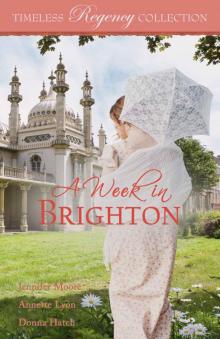 A Week in Brighton (Timeless Regency Collection Book 13)
A Week in Brighton (Timeless Regency Collection Book 13)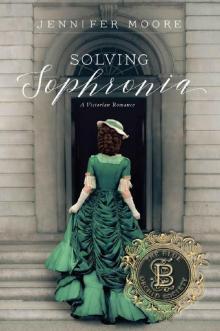 Solving Sophronia (The Blue Orchid Society, #1)
Solving Sophronia (The Blue Orchid Society, #1)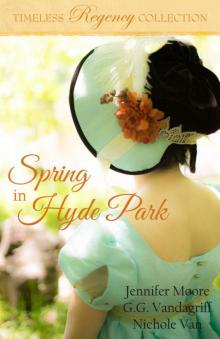 Spring in Hyde Park
Spring in Hyde Park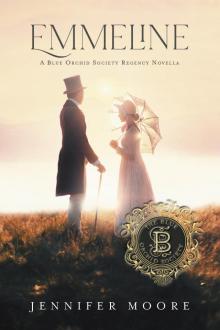 Emmeline
Emmeline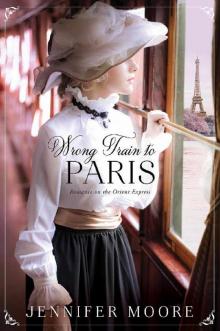 Wrong Train to Paris (Romance on the Orient Express, #2)
Wrong Train to Paris (Romance on the Orient Express, #2)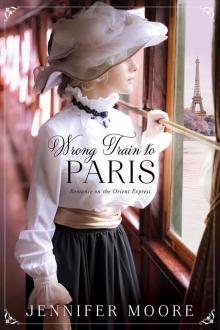 Wrong Train to Paris
Wrong Train to Paris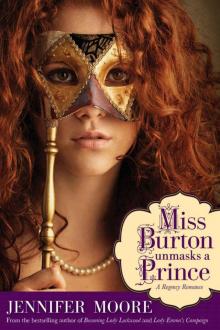 Miss Burton Unmasks a Prince
Miss Burton Unmasks a Prince Safe Harbor
Safe Harbor The Sheik's Ruby
The Sheik's Ruby Change of Heart
Change of Heart Lady Helen Finds Her Song
Lady Helen Finds Her Song Simply Anna
Simply Anna